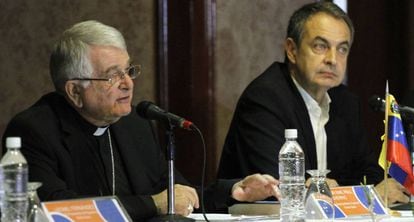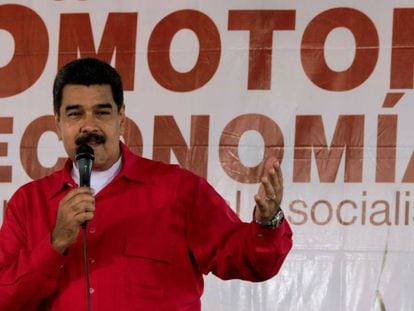Can Vatican-backed dialogue help bring peace to Venezuela?
Doubts remain about how much the talks can achieve in the strife-torn country

Venezuelan President Nicolás Maduro and members of his government are to meet with the country’s opposition forces later this month as both sides endeavor to end a worsening political and economic crisis under the auspices of international mediators that include Vatican envoys.
“The dialogue has begun” said Emil Paul Tscherrig, the Vatican representative dispatched by Pope Francis to try to bring the two camps closer together, after meeting with Venezuela’s opposition coalition, the Democratic Unity Roundtable (MUD).
The talks will take place on Margarita Island on October 30 under the auspices of the Vatican and the Union of South American Nations, said the Apostolic Nuncio to Argentina, announcing the negotiations. Their aim will be to promote “a mechanism for peaceful coexistence,” he said.
Tscherrig, who refused to take questions on the upcoming talks, said their structure would be based on the plans drawn up by the former presidents involved in the process: former Spanish Prime Minister José Luis Rodríguez Zapatero, and the former presidents of Pamana and the Dominican Republic, Martín Torrijos and Leonel Fernández respectively.
The announcement by the Pope’s representative came in the wake of news of a surprise visit to Pope Francis by Maduro who visited the Vatican after a whistle-stop tour of the Middle East’s oil capitals.
Opposition forces have kept silent on what impact they think the talks will have
During the private audience with Maduro, the pontiff urged both parties “to show courage in pursuing the path of sincere and constructive dialogue, to alleviate the suffering of the people, particularly of the poor, and to promote renewed social cohesion, which will allow the nation to look to the future with hope,” said the Vatican in a statement.
However, with Venezuela embroiled in a severe political crisis, it remains to be seen what the Vatican will be able to achieve.
Opposition forces, who are in the majority in Venezuela’s Congress, and who accuse Maduro of driving the once-prosperous oil nation into political and economic ruin, have scheduled a session on Tuesday in which they will look at “the constitutional status of President Nicolás Maduro” as they eye possible impeachment procedures against him.
The pressure is mounting on Maduro after the National Electoral Council (CNE) decided to indefinitely suspend the recall referendum against Maduro that the opposition has been organizing.
In Parliament on Sunday, the opposition called this suspension “a coup d’état” and “a break with the constitutional order.” It accused the government of placing constant hurdles in the path of a recall vote that is encoded as a right in the Venezuelan Constitution. Angry pro-government protesters then responded by storming the parliament in a bid to disrupt the session.
The Vatican says the goal of the talks is to promote “a mechanism for peaceful coexistence”
To date, opposition forces have made no public declarations as to what impact Papal intervention might have on Venezuela in terms of Tuesday’s parliamentary session or a series of street protests planned for this week.
But in what could be read as a coded message to more radical elements of the opposition, MUD secretary general Jesús Torrealba said: “Dialogue is a space for all Venezuelans who are looking for a peaceful solution to the situation.”
English version by George Mills.












































